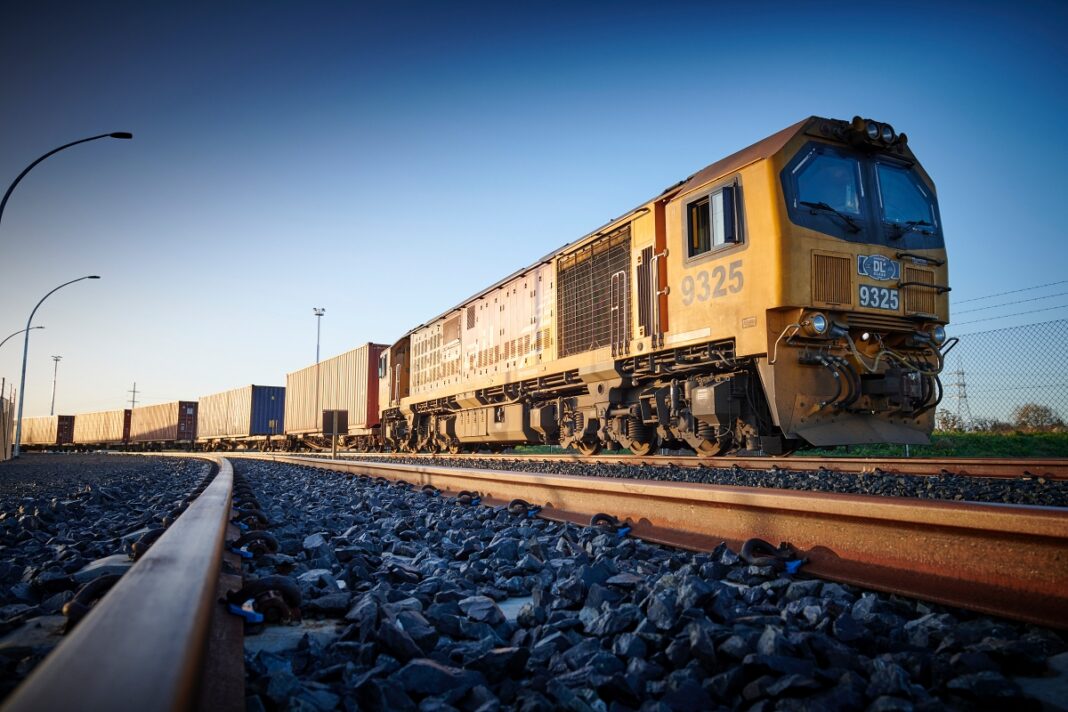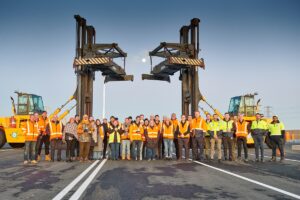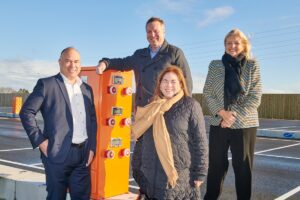Ruakura Inland Port – a newly minted, 9ha customs-controlled cargo facility on Hamilton’s eastern boundary – welcomed its first two goods trains, one each from Tauranga and Auckland in August. The new $60m facility has been more than 15 years in development by Tainui Group Holdings, the commercial entity of Waikato-Tainui, and will be operated in a joint-venture with Port of Tauranga – for an initial period of 50 years.
Senior management representing the JV were on hand to mark the first train from Tauranga rolling into the twin 800m rail sidings just after 7am on 3 August.
Tainui Group Holdings Chief Executive Chris Joblin said the milestone marked an exciting new opportunity for importers and exporters, especially in the Waikato and Bay of Plenty regions.
“This is a big step towards reducing carbon emissions from the Upper North Island supply chain. It gives importers and exporters the option to move away from the previously ubiquitous round-trip, road-based journeys, towards more rail-based one-way movements for cargoes,” Mr Joblin said.
Recent modelling commissioned by the JV from independent supply chain experts has confirmed potential cost savings of up to 30% for cargo owners using rail from Ruakura Inland Port – compared to the round-trip, road-served transport model from Hamilton to Tauranga and Auckland.
Initially, two trains a week, each capable of carrying around 90 containers called at Ruakura Inland Port as the inland port underwent final commissioning during August. Train calls will now be increased to match demand. KiwiRail operates more than 85 train services per week between MetroPort Auckland and Tauranga which pass through Ruakura.
This year will also see the opening of other large-scale businesses at the adjacent Ruakura Superhub. These include the 40,000m2 Kmart Distribution Centre, and new cold storage facilities operated by global player Maersk (16,000m2) and Big Chill (13,000m2), which will generate freight through the inland port.
Leonard Sampson, Chief Executive of Port of Tauranga says partnering with TGH to operate the inland port has delivered strategic infrastructure which will amplify the connectivity of the Port’s existing facilities.
“By combining Port of Tauranga’s expertise in developing and operating ports, with the deep regional connections of TGH, and the scale and efficiency of the Ruakura location we can deliver more value for our regions and customers,” he says.
Quality Marshalling Ltd (a 100% owned subsidiary of Port of Tauranga) will manage physical operations at the inland port.
The JV is forecasting to handle around 40,000 TEU¹ transferred through the Inland Port in the first year of operations.
Peter Reidy, CEO of Kiwi Rail, also welcomes the opening of this strategic node on the national rail network.
“It is not only an expansion, but a better utilisation of our national rail network. We believe that rail offers resilience against supply chain disruptions, and it is good to see increasing interest and use.
Importantly, this project shows an increased connectivity of our infrastructure to benefit cargo owners and consumers across the country to help decarbonise land transport in New Zealand.”
Chris Joblin of TGH sees the opening as a point of pride for the region’s economic infrastructure. “It is exciting to see another dot on the map for Hamilton.
This is the type of infrastructure to really cement the city’s importance in the New Zealand’s economic landscape. With Ruakura Inland Port operating and the adjacent Waikato Expressway, it’s an alignment of infrastructure that will deliver great value for our country, region and Waikato-Tainui,” says Chris Joblin.
¹ TEUs = twenty foot equivalent units, a standard measure of shipping containers






